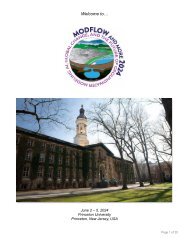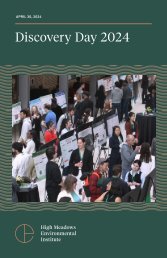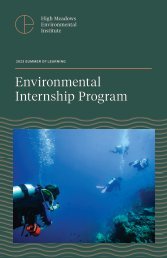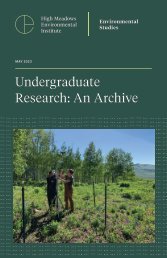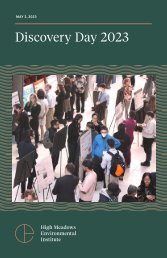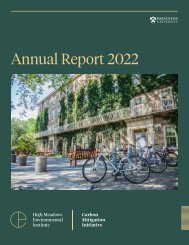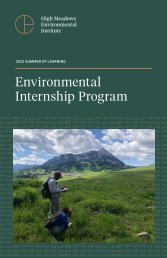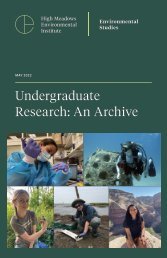CMI Annual Report 2021
Create successful ePaper yourself
Turn your PDF publications into a flip-book with our unique Google optimized e-Paper software.
Research – At a Glance<br />
Toward Accelerating the Deployment of CO 2<br />
Capture and<br />
Storage Hubs<br />
PRINCIPAL INVESTIGATOR: ERIC LARSON<br />
Carbon dioxide (CO 2<br />
) capture and storage, including at bioenergy conversion facilities, will be crucial if the U.S.<br />
is going to reach net-zero emissions by 2050. The Energy Systems Analysis group launched new research in<br />
<strong>2021</strong> to explore with high spatial and temporal resolution how these features of the future energy landscape<br />
might evolve most expeditiously. The research attempts to understand the potential performance, benefits,<br />
costs, and challenges of deploying regional “hubs,” which are clusters of CO 2<br />
capture sites linked via pipeline<br />
networks to storage injection sites. A deep understanding of such hubs will help inform public and private<br />
decision-making to accelerate their deployment. An initial regional focus is the Louisiana Gulf Coast.<br />
Bridging the Gap Between CCS Ambition and Reality<br />
PRINCIPAL INVESTIGATOR: CHRIS GREIG<br />
Most integrated assessment and other macro-scale energy system models find that widespread carbon capture<br />
and storage (CCS) at very large scales is crucial to achieve ambitious CO 2<br />
reduction goals. However, these<br />
models assume that abundant low-cost geological storage is available to meet all needs. This research presents<br />
the contrasting view that storage capacity uncertainty could seriously hamper the pace and scale of CCS<br />
deployment, especially in developing Asian economies. This storage capacity uncertainty leads to “chicken-oregg”<br />
challenges that deter investment. The implications for emissions reduction goals and the role that CCS<br />
should play in a net-zero future warrant more attention.<br />
REPEAT Project Provides Real-time Look at Evolving U.S.<br />
Climate Policy<br />
PRINCIPAL INVESTIGATOR: JESSE JENKINS<br />
The REPEAT Project is led by Jesse Jenkins of the Princeton ZERO Lab. It provides a detailed, “real-time”<br />
evaluation of the United States’ evolving energy and climate policies and the country’s progress on the road to<br />
net-zero greenhouse gas emissions. The Project uses a novel suite of geospatially-granular planning, modeling,<br />
and visualization tools coupled with macro-scale optimization models of the United States energy system. The<br />
goal is to publish regular, timely, and independent environmental and economic evaluation of federal energy<br />
and climate policies as they are proposed and enacted. (See repeatproject.org.)<br />
Carbon Mitigation Initiative Twenty-first Year <strong>Report</strong> <strong>2021</strong><br />
8




